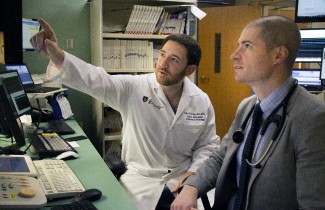Health Services and Patient-Oriented Outcomes Research
Renal Denervation (RDN) Registry
Renal denervation (RDN), a procedure in which renal artery nerves are strategically ablated to lower blood pressure, is a minimally invasive method of treating resistant hypertension. Dr. Secemsky helped lead a clinical study of RDN that precipitated the FDA's approval of the procedure in 2023. Today, BIDMC's Complex Hypertension Clinic and other sites around the country perform RDN on a growing number of patients with resistant hypertension. The RDN registry being launched by Dr. Secemsky's team will act as a shared repository of patient treatment and outcomes information that RDN sites can use to monitor their patients and assess the longevity of RDN therapy. See BIDMC's press release on their Complex Hypertension Clinic to learn more about how Beth Israel approaches care for patients with uncontrolled hypertension.
Patient-Reported Outcome Measures for Peripheral Artery Disease (PAD-PROMs)
The evaluation of patient-reported outcomes measures (PROMs) is a healthcare priority nationally and at BIDMC. PROMs are crucial to BIDMC's ability to continually improve patient care. This study employs PROMs to determine the success rate of symptom management strategies in patients with peripheral artery disease (PAD), a condition that restricts blood flow to the legs or arms.
Shared Decision-Making to Improve the Health Status of Patients with Claudication: Developing and Implementing Strategies to Individualize Treatment Decisions
This project, led by Eric Secemsky, MD, involves the development and validation of prediction tools for patients with claudication and focuses on patient-reported outcomes measures. Through pairing these tools with educational material and patient and clinician input, the goal is to design, implement, and prospectively evaluate a personalized shared decision-making aid for treatment of peripheral artery disease.
Temporal Trends and Practice Variation in the Use of Intravascular Ultrasound During Peripheral Vascular Procedures
This multi-year collaboration with Philips intends to better characterize how intravascular ultrasound (IVUS) is being used in the US among Medicare beneficiaries undergoing peripheral vascular intervention (PVI) (arterial and venous) in multiple clinical settings (inpatient, outpatient, and office-based labs). In addition, this study aims to examine variation in use among physician operators, both as a group and within different clinical settings. To read a consensus statement published by Dr. Secemsky and others on the appropriate use of IVUS during lower extremity interventions, click here.
Pulmonary Embolism Research
The complexity of many acute pulmonary embolism (PE) cases warrants a rapid, organized response by a multidisciplinary cohort of clinicians who can advise on the best course of treatment. Massachusetts General Hospital launched such a response team, called PERT, in 2012. PERTs have since been implemented in hospitals around the nation and the world. As the chair of the Research Committee for the PERT Consortium, a national collaboration of PERT members, Dr. Secemsky has spearheaded the creation of an online registry documenting the assessment, treatment and outcomes of patients seen by PERTs, with the goal of improving care and outcomes for individuals with PE.
Drs Secemsky and Kim are collaborating with Boston Scientific to leverage Truveta's PE dataset in an investigation into how timing of PE presentation and intervention may influence patient outcomes.
Clinical Trials

SPYRAL AFFIRM: Global Study of Renal Denervation in Subjects with Uncontrolled Hypertension
The SPYRAL AFFIRM Study aims to evaluate long-term safety, efficacy and durability of the Spyral system for renal denervation in patients with hypertension. BIDMC is one of several national recruiting sites, and the only active site in Massachusetts. For more information, please see the trial’s posting on the clinicaltrials.gov website.
Drug-Eluting Registry: Real-World Treatment of Lesions in the Peripheral Vasculature
The ELEGANCE Registry, sponsored by Boston Scientific, is collecting data from patients treated with commercially available BSC drug-eluting devices marketed for treatment of lesions located in the peripheral vasculature. A goal of the study is to include populations not previously represented in peripheral vascular disease trials. For more information, please see the trial’s posting on clinicaltrials.gov.

